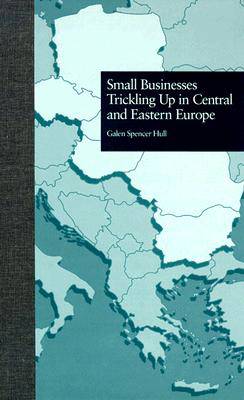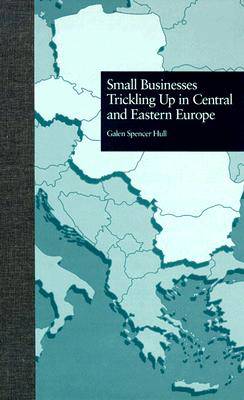
- Retrait gratuit dans votre magasin Club
- 7.000.000 titres dans notre catalogue
- Payer en toute sécurité
- Toujours un magasin près de chez vous
- Retrait gratuit dans votre magasin Club
- 7.000.000 titres dans notre catalogue
- Payer en toute sécurité
- Toujours un magasin près de chez vous
Small Businesses Trickling Up in Central and Eastern Europe
Galen Spencer Hull
22,95 €
+ 45 points
Format
Description
First published in 1999. Small businesses now constitute the most dynamic element of growth in the emerging markets of the Central and Eastern European region. This book argues that the small and medium sized enterprise (SME) sector has contributed more to the growth of these countries in transition than have privatized state enterprises and the public sector. In 1989 most of the countries of Eastern and Central Europe were still under an economic system dominated by state-owned enterprises. Since then a process of liberalization has been unleashed to promote free market policies. This has involved programs of privatization and restructuring of public enterprises, as well as the promotion of policies to enable a private sector to develop. Small businesses are creating thousands of new jobs while large companies are retrenching and downsizing their work force.
In some countries of the region this process is much further along than in others. However, the SME sector has developed at a more rapid pace than has the privatization of the large public companies. There has been a flurry of new enterprises springing up throughout the region which are trickling up in a frequently hostile environment against tremendous odds, and yet managing to have a pronounced impact on their respective economies. Small businesses have taken over in sectors that used to be dominated by big enterprises, primarily in services and consumer products. They have provided a crucial outlet for pent-up entrepreneurial talent that had remained dormant during the long period of state domination.
This work urges legislators, policy-makers, and development agencies alike to take account of the importance of the SME's in their legislation and planning. Given a more favorable environment, these small businesses will provide even greater impetus for economic growth. Equally important is for entrepreneurs themselves to be convinced of the rightness of their path in societies that have traditionally looked down upon profit-seekers as unscrupulous and selfish. If the CEE region is to achieve its full potential of economic growth, policies and support mechanisms to promote the SME sector will be needed to assure a favorable environment.
In some countries of the region this process is much further along than in others. However, the SME sector has developed at a more rapid pace than has the privatization of the large public companies. There has been a flurry of new enterprises springing up throughout the region which are trickling up in a frequently hostile environment against tremendous odds, and yet managing to have a pronounced impact on their respective economies. Small businesses have taken over in sectors that used to be dominated by big enterprises, primarily in services and consumer products. They have provided a crucial outlet for pent-up entrepreneurial talent that had remained dormant during the long period of state domination.
This work urges legislators, policy-makers, and development agencies alike to take account of the importance of the SME's in their legislation and planning. Given a more favorable environment, these small businesses will provide even greater impetus for economic growth. Equally important is for entrepreneurs themselves to be convinced of the rightness of their path in societies that have traditionally looked down upon profit-seekers as unscrupulous and selfish. If the CEE region is to achieve its full potential of economic growth, policies and support mechanisms to promote the SME sector will be needed to assure a favorable environment.
Spécifications
Parties prenantes
- Auteur(s) :
- Editeur:
Contenu
- Nombre de pages :
- 306
- Langue:
- Anglais
- Collection :
Caractéristiques
- EAN:
- 9780815332367
- Date de parution :
- 01-04-99
- Format:
- Livre relié
- Format numérique:
- Genaaid
- Dimensions :
- 148 mm x 224 mm
- Poids :
- 458 g







